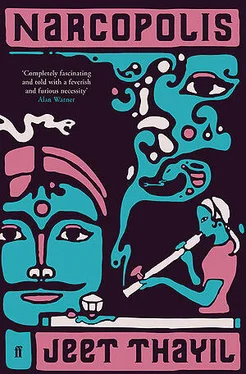‘The killers are barely out of their teens, rabid youths, so-called radicals who hunt in gleeful packs,’ said the usually dapper Wei, looking bedraggled, and was he smelling of wine? ‘Anything can happen to anyone at any time. Did you hear what happened to Commissar Hu?
A big-character wall poster appeared one day, said Wei, denouncing Hu as a “son of a landlord,” a “degenerate dog” and a “seller of scars”. Those kinds of names are thrown around a lot these days, so maybe he should have ignored it. But the poster also said Hu was guilty of sexual perversion with degenerate like-minded women. You know Hu or you don’t, but he’s not the kind of man who will take abuse without fighting back. He called a meeting. He said his accusers were reactionaries and rightists. They were a danger to the Party. He said they were cowards, hiding behind the anonymity of wall posters. He challenged them to come out into the open. The same night fresh wall posters went up accusing Hu of counter-revolution. The accusations and counter-accusations were noticed and the Party sent a Work Team to investigate. The Work Team banned the students from putting up any more posters, but it also reproved Hu, saying he should confess to some of his mistakes. Instead of restoring the peace, the team’s actions had the opposite effect. The students defied the ban and plastered posters all over the city. They mobilized student groups in other cities and they sent spokesmen to the highest levels of the party bureaucracy. The response must have been favourable because they stepped up their attacks. The next lot of wall posters gave details of Hu’s alleged perversions. Prostitutes. Group sex. Sodomy. Homosexuality. And it was at this stage that Hu made his terrible mistake. He denied all charges and then he said, so what if it is true? Even the Chairman isn’t a eunuch when it comes to sex. They came for him the next day. They put black paint on his face and paraded him through the streets. They put him in a cage and hung a sign on the bars, animal exhibition. They didn’t let him sleep or wash or talk. It took two weeks for him to confess that he had impugned the Chairman and that he was guilty of sexual and other crimes. Pang Mei testified that he had taken advantage of her and introduced her to foreign perversions. His own daughters were forced to denounce him. He’s being purged, said Wei. But the only question Lee could think of asking was, What happened to Pang Mei?
*
She was disgraced, said Wei. The students took turns to work on her in groups. They humiliated her, taunted her, called her names on the street, talked to her family and colleagues, raided her quarters at all hours of day and night. After a few weeks, when they knew she was nearing her breaking point, they put up a poster that said she would not be allowed to commit suicide. I heard she was sent away for re-education through labour. Isn’t it a good thing you decided not to marry her? What a mistake you would have committed. Then Wei said, I’m here to warn you. There have been posters attacking our department, and me personally. If I am under attack, you are next. There are few things you can be certain of at this time: blood lust; group attacks against those who are alone or isolated; packs of dogs running wild through the streets; the end. This is our reality. Anything can happen to anyone at any time.
He put an official requisition through for a jeep. The requisition was a lie from beginning to end. He expected to be found out and arrested and punished, but nothing happened and the jeep came through. He found a map of old Asia. Names change but geography stays the same, he told himself, and he put his trunks into the jeep and drove south and never once looked back. He drove long stretches, drove as long as he could before the necessity of food or sleep made him stop. He travelled at night and slept in his uniform. When necessary, he said he was on special assignment for his division. He stopped in Sian and Chengtu and Kunming. He found that his map was so out of date it was inaccurate. He burned it and bought a new one. Once he left China travel became easier. He didn’t have to worry about being caught: Burma was primitive and India was chaos, nobody asked for papers or explanations. He lived in Dacca, Calcutta, Cuttack, Amritsar. He lived in Delhi. In many places he found people who looked like him, Indians from the country’s north-east provinces. He lived in cities and towns that he never learned the names of. He lived in hostels and guest houses and ramshackle lodgings. He learned to drive like an Indian. He abandoned his jeep and bought an Ambassador and he thought he would keep driving until he got tired of it, but he never tired of it. Then why had he chosen to stop in Bombay instead of Delhi or Calcutta? The truth was, he had not chosen. He came to the city with no intention of staying: it was the last of a series of random events set off by his flight from his own country. He got into the habit of taking long walks in his first months, a time of aftermath and distrust, his perils behind him but vivid in his head. It was only when he left his small room and walked by the waterfront that he felt at ease. He discovered the sea by accident, in his first week, on an exploratory walk that began around the neighbourhood of Grant Road and ended at Nariman Point. He walked for three hours and during most of that time the water was either in his sight or just beyond. He began to see it as a gift, the sea, because it was always nearby, wherever you were. It was the only thing about Bombay that did not disgust him.
*
‘My father was an important man and I.’
‘I know, you told me before. You were in the army, you were important too.’
‘I was, in the old days.’
She said, ‘You should rest, don’t agitate yourself about these things.’
He shook his head. He wanted her to understand. He pointed at the trunk that held his uniform, his identification documents and photos, paid and unpaid electricity and water bills. He said, You. He pointed to the pipes, pointed twice, his hand travelling slowly from cot to cot. He said, Now I not important. I just old man with sickness, not much to give you except pipe. I want you take them. They only valuable thing I own: they your dowry. He nodded at her.
‘Ah Lee, I want you to live for a long time,’ she said.
And Mr Lee made a small sound. She would remember it whenever she thought about him in the years after his death, the involuntary vowel that ascended from deep inside his lungs. It communicated more clearly than words the thing he was trying to say, that it was a humiliation to die and a double humiliation to die in a foreign country. And she remembered the lie she told him. Twenty-two years later, in 1998, when she was diagnosed with the same ailment, she remembered her lie. A man who does not return to his native place is like a man who dresses in finery and sits in the dark, he told her. He had always planned to return to China in his old age, to die there and be buried beside his ancestors. He said, You promise to rebury me in China. However long it take, you rebury me. She wanted to calm him. She said: Ah Lee, don’t worry, I promise. Later, long after he was gone, she would recall all this with terrible clarity; most of all she remembered his last days and the instructions he left. She was to place his ashes in a vase she would find in his trunk. Cremation was quicker than burial, he said, and ashes were easy to transport and easy to store. Beyond these points of business, he hardly spoke or ate; all he wanted was opium. He was willing himself to die.
*
On a dry morning in April, she took his ashes by taxi to the Chinese graveyard in Sewri. The front seat of the Ambassador was filled with flowers and Dimple sat in the back with Ah Fong, Mr Lee’s old friend and customer, who had to be helped into the car.
Читать дальше












